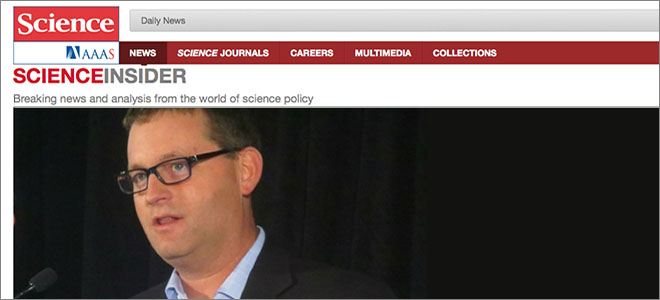Roger Pielke, Jr. interviewed in Science Magazine:
By Eli Kintisch
Science Magazine
March 4, 2015
Conflicts of interest and disclosure of funding sources have been topics du jour lately in science policy circles. Last month activists opposed to genetically modified food rattled academic scientists working in that field by submitting requests for their correspondence under state open records laws. Then the Union of Concerned Scientists released a report warning that such requests can become vehicles for harassing academic researchers. In Wisconsin, an ongoing effort by the state’s largest public university to shield some research efforts from freedom of information requests has caused controversy.
Then, in the highest profile development, news outlets released information gathered by environmental groups about the funding sources of Willie Soon, a scientist at the Harvard-Smithsonian Center for Astrophysics in Cambridge, Massachusetts. The groups alleged that Soon, a prominent critic of mainstream climate science and opponent of government action on climate change, had not disclosed funding from corporate sponsors to journals that published his work, potentially violating journal policies. The Smithsonian has launched an investigation.
The Soon revelations inspired Senator Edward Markey (D–MA) to send letters to numerous energy industry groups, asking them to disclose the names of scientists they had funded. They also prompted Representative Raul Grijalva (D–AZ), the top Democrat on the Natural Resources Committee of the U.S. House of Representatives, to launch an investigation last week into the funding sources of seven academics who have studied climate change or testified before Congress on the matter, often to criticize research findings or policy proposals. Grijalva asked universities to provide the salaries of the seven, official disclosure policies and statements, details on any external funding sources of the academics, and copies of any “communications” related to testimony they provided to government bodies.
Grijalva’s wide-ranging request caused an uproar, including claims that it represented a “witch hunt,” as well as letters expressing concern about the balance between transparency and academic freedom from the American Geophysical Union and the American Metrological Society. This week, Grijalva backed off a bit, saying the request for correspondence was an “overreach,” but defending the push for disclosure.
One of the scientists targeted by Grijalva is Roger Pielke Jr., a science policy expert at the University of Colorado, Boulder. Pielke has been something of a lightning rod in climate debates, sometimes drawing attacks from all sides as a result of his views on research and policy. He’s also written extensively on conflict of interest, and has been actively tweeting and blogging in recent days in defense of himself.
Yesterday, ScienceInsider spoke to Pielke by phone. This interview has been edited for clarity and brevity.
Q: When the Soon stories came out last week, you said he should have mentioned his conflict of interest, but otherwise the issue was blown out of proportion. Yet the Smithsonian, which jointly runs his institution, is carefully investigating it.
A: I’ve written on conflict of interest for a long time, and I’ve participated in efforts to tighten up conflict of interest policies in the scientific community; I’m currently on a National Research Council committee that’s doing just that. It’s a really important issue. Five years ago I was one of the strongest critics of the [Intergovernmental Panel on Climate Change] for not having any conflict of interest policies.
By all means, Willie Soon, whom I don’t know and I don’t know anything about his research, should follow the guidelines of his institution, and the journals in which he publishes, and Congress when he testifies. If he’s violated those requirements he’s done something that’s pretty serious … But if you look at our community, the failure to disclose conflicts of interest is fairly endemic. Economics has dealt with this; the medical sciences have dealt with this; the geosciences really haven’t.
Q: Senator Markey says that companies in the fossil fuel industry should disclose the outside scientists they fund. Do you agree?
A: The best way for that disclosure to occur is in the reporting process, by individuals who are funded, in their disclosures to journals, their institutions, or Congress when you testify. Getting companies to release information on who they fund and what they fund is probably a difficult fight.
Q: Do you think we have sufficient standards for disclosure for scientists?
A: I was part of a 2009 report by the Bipartisan Policy Center [a Washington, D.C. think tank] on conflict of interest policies. What we sought to do was to tell the government to harmonize policies on this across the federal agencies, to provide advice to the incoming Obama administration to restore integrity to science. And we said journals should have clear policies on disclosure.
But one thing to keep in mind is that you can’t judge research by who funds it. Once disclosure is done the research should be judged on its merits.
Q: Have you ever turned down funding because you were concerned about how it would look to disclose it?
A: Never. Unfortunately that’s not a problem I’ve had, nobody’s knocking on my door offering me money.
Q: Have you received any funding that you haven’t disclosed?
A: No.
Q: Five years ago you told us you wanted to stop publishing on climate policy. Why?
A: Yes, [that decision has] been a few years in the making. You know, I wrote my dissertation on science in the climate debate. I’ve written on mitigation, adaptation, geoengineering, impacts of climate change. So, intellectually, the benefits of continuing to do work in this area aren’t that high. On the other end of the conversation, the cost of participating in the issue continue to go up. Between being run out of [the popular statistics blog FiveThirtyEight.com] for writing on my research last year and what’s happening this week [in] Congress, a lot of folks want to make the issues surrounding climate about me, instead of the issues. That makes it fairly untenable to participate.


